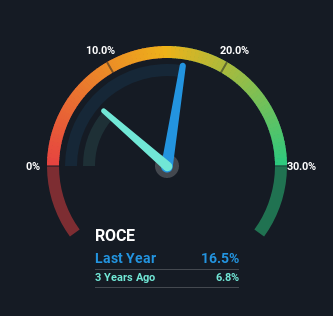- Greece
- /
- Medical Equipment
- /
- ATSE:MEDIC
There Are Reasons To Feel Uneasy About Medicon Hellas' (ATH:MEDIC) Returns On Capital

To find a multi-bagger stock, what are the underlying trends we should look for in a business? One common approach is to try and find a company with returns on capital employed (ROCE) that are increasing, in conjunction with a growing amount of capital employed. This shows us that it's a compounding machine, able to continually reinvest its earnings back into the business and generate higher returns. Having said that, from a first glance at Medicon Hellas (ATH:MEDIC) we aren't jumping out of our chairs at how returns are trending, but let's have a deeper look.
Return On Capital Employed (ROCE): What Is It?
If you haven't worked with ROCE before, it measures the 'return' (pre-tax profit) a company generates from capital employed in its business. To calculate this metric for Medicon Hellas, this is the formula:
Return on Capital Employed = Earnings Before Interest and Tax (EBIT) ÷ (Total Assets - Current Liabilities)
0.16 = €4.6m ÷ (€33m - €4.8m) (Based on the trailing twelve months to June 2022).
So, Medicon Hellas has an ROCE of 16%. In absolute terms, that's a satisfactory return, but compared to the Medical Equipment industry average of 8.9% it's much better.
Check out our latest analysis for Medicon Hellas

Historical performance is a great place to start when researching a stock so above you can see the gauge for Medicon Hellas' ROCE against it's prior returns. If you're interested in investigating Medicon Hellas' past further, check out this free graph of past earnings, revenue and cash flow.
What Does the ROCE Trend For Medicon Hellas Tell Us?
In terms of Medicon Hellas' historical ROCE movements, the trend isn't fantastic. Over the last five years, returns on capital have decreased to 16% from 33% five years ago. However, given capital employed and revenue have both increased it appears that the business is currently pursuing growth, at the consequence of short term returns. And if the increased capital generates additional returns, the business, and thus shareholders, will benefit in the long run.
On a related note, Medicon Hellas has decreased its current liabilities to 15% of total assets. Considering it used to be 75%, that's a huge drop in that ratio and it would explain the decline in ROCE. Effectively this means their suppliers or short-term creditors are funding less of the business, which reduces some elements of risk. Since the business is basically funding more of its operations with it's own money, you could argue this has made the business less efficient at generating ROCE.
The Bottom Line
While returns have fallen for Medicon Hellas in recent times, we're encouraged to see that sales are growing and that the business is reinvesting in its operations. And the stock has done incredibly well with a 321% return over the last five years, so long term investors are no doubt ecstatic with that result. So while investors seem to be recognizing these promising trends, we would look further into this stock to make sure the other metrics justify the positive view.
Medicon Hellas does have some risks though, and we've spotted 1 warning sign for Medicon Hellas that you might be interested in.
While Medicon Hellas may not currently earn the highest returns, we've compiled a list of companies that currently earn more than 25% return on equity. Check out this free list here.
New: Manage All Your Stock Portfolios in One Place
We've created the ultimate portfolio companion for stock investors, and it's free.
• Connect an unlimited number of Portfolios and see your total in one currency
• Be alerted to new Warning Signs or Risks via email or mobile
• Track the Fair Value of your stocks
Have feedback on this article? Concerned about the content? Get in touch with us directly. Alternatively, email editorial-team (at) simplywallst.com.
This article by Simply Wall St is general in nature. We provide commentary based on historical data and analyst forecasts only using an unbiased methodology and our articles are not intended to be financial advice. It does not constitute a recommendation to buy or sell any stock, and does not take account of your objectives, or your financial situation. We aim to bring you long-term focused analysis driven by fundamental data. Note that our analysis may not factor in the latest price-sensitive company announcements or qualitative material. Simply Wall St has no position in any stocks mentioned.
About ATSE:MEDIC
Flawless balance sheet second-rate dividend payer.
Market Insights
Community Narratives



